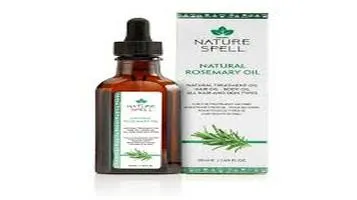Rosemary Oil: Nature's Versatile Elixir
Rosemary oil, extracted from the aromatic herb Rosmarinus officinalis, is a versatile essential oil celebrated for its numerous health and beauty benefits. Known for its invigorating and refreshing scent, rosemary oil is often used in aromatherapy to boost mental clarity, focus, and memory. Rich in antioxidants and anti-inflammatory compounds, it is reputed to support hair health by stimulating follicles, promoting hair growth, and reducing dandruff. Additionally, rosemary oil is often used in skincare for its ability to rejuvenate and tone the skin. Its antimicrobial properties make it effective in treating minor cuts and infections. Whether used in diffusers, massage oils, or beauty products, rosemary oil is a natural remedy that enhances well-being and vitality.

Rosemary oil, derived from the aromatic herb Rosmarinus officinalis, has been a cherished staple in the realms of culinary arts, traditional medicine, and aromatherapy for centuries. Known for its woody, evergreen scent and a myriad of therapeutic benefits, rosemary oil is a versatile and powerful essential oil that deserves a spot in every household. In this review, we will delve into the various facets of rosemary oil, including its origins, composition, uses, and benefits, to provide a comprehensive understanding of this remarkable natural elixir.
Origins and Composition
Rosemary is native to the Mediterranean region, where it has been used for its medicinal properties since ancient times. The oil is extracted from the flowering tops and leaves of the rosemary plant through steam distillation, a process that preserves its potent compounds. The primary chemical constituents of rosemary oil include 1,8-cineole, camphor, and alpha-pinene, which contribute to its distinctive aroma and therapeutic properties.
Aromatherapy and Mental Clarity
One of the most popular uses of rosemary oil is in aromatherapy. The invigorating scent of rosemary oil is known to stimulate the mind, improve concentration, and enhance memory. Several studies have supported these claims, suggesting that inhaling rosemary oil can increase alertness and cognitive performance. For students and professionals alike, diffusing rosemary oil in a study or work environment can provide a natural boost to focus and mental clarity.
Hair and Scalp Health
Rosemary oil has earned a well-deserved reputation in the world of hair care. It is often included in shampoos, conditioners, and hair treatments due to its ability to stimulate hair growth and improve scalp health. The oil works by increasing blood circulation to the scalp, which in turn promotes hair follicle health and encourages new hair growth. Additionally, its antifungal and antibacterial properties help to combat dandruff and other scalp conditions.
To use rosemary oil for hair care, simply mix a few drops with a carrier oil such as coconut or jojoba oil and massage it into the scalp. Leave it on for at least 30 minutes before rinsing thoroughly. Regular use can result in thicker, shinier, and healthier hair.
Skin Care Benefits
Rosemary oil is also beneficial for the skin. Its anti-inflammatory and antiseptic properties make it an excellent choice for treating acne and oily skin. It helps to reduce redness and puffiness, and its astringent qualities assist in toning the skin and tightening pores. The antioxidants in rosemary oil fight free radicals, which can help prevent signs of aging and promote a youthful complexion.
For a simple yet effective skincare treatment, add a few drops of rosemary oil to a carrier oil like almond or grapeseed oil and apply it to the face. This can help to clear blemishes, balance oil production, and rejuvenate the skin.
Pain Relief and Muscle Relaxation
Rosemary oil is often used in massage therapy for its ability to relieve muscle pain and tension. Its analgesic and anti-inflammatory properties make it an excellent natural remedy for sore muscles, arthritis, and rheumatism. When applied topically, it can help to reduce pain and improve circulation, promoting faster healing of strained or injured muscles.
To use rosemary oil for pain relief, dilute it with a carrier oil and massage it into the affected area. Adding a few drops to a warm bath can also provide relief from muscle aches and stiffness.
Immune System Support
The immune-boosting properties of rosemary oil should not be overlooked. Its antimicrobial and antioxidant effects help to strengthen the body's natural defenses against infections and diseases. Diffusing rosemary oil in the home can purify the air, reducing the presence of airborne pathogens and promoting a healthier living environment.
Culinary Uses
While not as commonly discussed, rosemary oil can also be used in cooking. A small amount can add a burst of flavor to dishes, but it is essential to use it sparingly due to its potency. Always ensure that the oil is food-grade before using it in culinary applications.
Safety and Precautions
As with any essential oil, it is important to use rosemary oil with caution. It should always be diluted with a carrier oil before applying to the skin to prevent irritation. Pregnant and breastfeeding women, as well as individuals with epilepsy or high blood pressure, should consult a healthcare professional before using rosemary oil. Additionally, it is important to conduct a patch test before using the oil to ensure there are no adverse reactions.
Conclusion
Rosemary oil is a multifaceted essential oil with a wide range of applications and benefits. From enhancing mental clarity and promoting hair growth to soothing sore muscles and supporting the immune system, it is a valuable addition to any natural wellness routine. Its rich history and proven efficacy make it a timeless remedy that continues to be relevant in modern holistic health practices. Whether used in aromatherapy, skincare, hair care, or even cooking, rosemary oil stands out as a versatile and powerful elixir worthy of its esteemed reputation.






